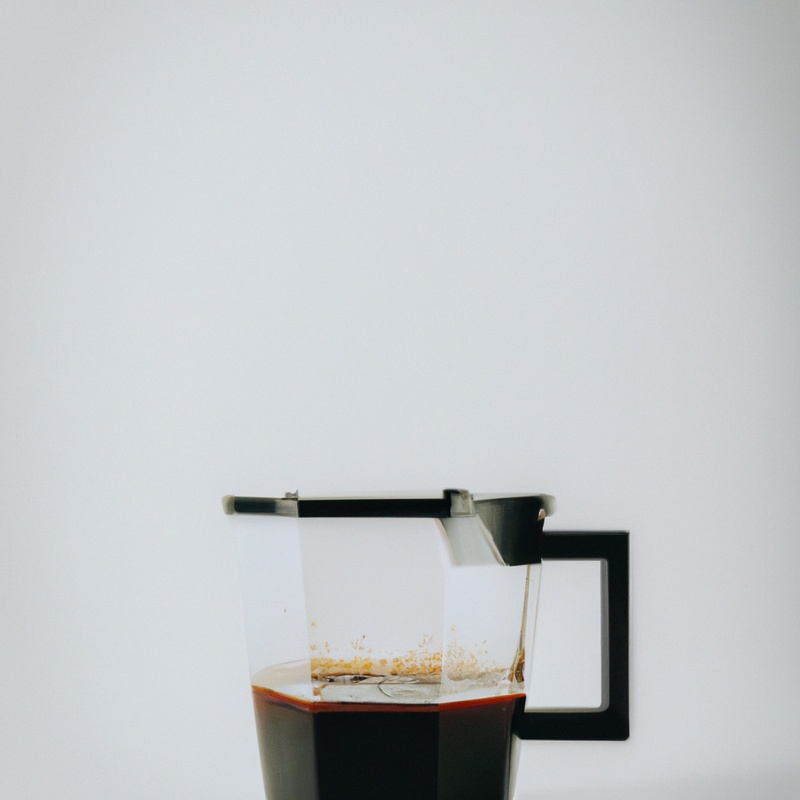Key Takeaways:
- Cold brew coffee generally has a higher caffeine content than regular coffee.
- The brewing process of cold brew coffee results in a smoother and less acidic taste compared to regular coffee.
- Cold brew coffee is typically brewed using a higher coffee-to-water ratio than regular coffee.
- The longer brewing time of cold brew coffee allows for a more concentrated flavor and aroma profile.
Are you a coffee lover searching for the ultimate caffeine kick? Wondering if cold brew is the supreme champion of strength in the coffee world?
Well, you've come to the right place! In this blog post, we'll explore the fascinating world of cold brew and regular coffee, diving deep into their brewing processes and taste profiles.
But the burning question remains – is cold brew actually stronger than regular coffee? We'll uncover the truth by examining the caffeine content, factors affecting strength, and personal perception.
Get ready for the ultimate showdown – cold brew vs.
regular coffee!
| Cold Brew Coffee | Regular Coffee | |
|---|---|---|
| Caffeine Content | Higher | Lower |
| Acidity | Lower | Higher |
| Taste | Smooth and Less Bitter | Bold and Bitter |
| Brewing Time | Longer | Shorter |
| Preparation | Requires special equipment and time | Can be prepared quickly |
What is Cold Brew?
Cold Brew is a type of coffee made by steeping coffee grounds in cold water for an extended period of time, resulting in a smooth and less acidic flavor profile.
Definition of Cold Brew
Cold brew is a type of coffee that is made by immersing coarsely ground coffee beans in cold water for an extended period of time, usually around 12 to 24 hours. The slow steeping process extracts the flavors from the beans, resulting in a smoother, less acidic taste compared to regular hot brewed coffee.
The resulting cold brew concentrate is usually mixed with water or milk before it is consumed.
It can be served over ice or enjoyed hot.
How is Cold Brew Made?
Cold brew is made by steeping coarsely ground coffee in cold or room temperature water for an extended period of time, typically 12 to 24 hours.
The coffee is then filtered to remove the grounds, resulting in a smooth and less acidic coffee concentrate.
It can be enjoyed over ice or diluted with water or milk to taste.
It's a simple and refreshing way to make coffee without using heat.
How does Cold Brew Differ from Regular Coffee?
Cold brew differs from regular coffee in terms of the brewing process and taste.
Brewing Process Comparison
When comparing the brewing processes of cold brew and regular coffee, there are a few key differences to consider.
Firstly, cold brew coffee requires a longer steeping time, usually around 12-24 hours, whereas regular coffee can be brewed in just a few minutes.
Secondly, cold brew is made by steeping coffee grounds in cold or room temperature water, while regular coffee is brewed with hot water.
Lastly, cold brew coffee tends to have a smoother and less acidic taste compared to regular coffee.
Taste Comparison
Taste Comparison: Cold brew and regular coffee have distinct taste profiles. Cold brew is known for its smooth, mellow flavor with a hint of sweetness.
It is less acidic and less bitter compared to regular coffee.
On the other hand, regular coffee has a robust and bold taste, often described as more acidic and bitter. The taste of coffee can vary depending on factors such as the type of beans used, brewing method, and personal preferences.
Ultimately, it's a matter of personal taste.

Is Cold Brew Stronger than Regular Coffee?
Is cold brew stronger than regular coffee? Let's find out.
Caffeine Content in Cold Brew vs Regular Coffee
Cold brew typically has a lower caffeine content than regular coffee. The brewing process of cold brew involves steeping coffee grounds in cold water for an extended period, resulting in a smoother and less acidic flavor profile.
This longer steeping time also extracts less caffeine compared to the faster brewing methods used for regular coffee.
However, the actual caffeine content can vary depending on the ratio of coffee to water used and the specific brand or beans used for brewing. It's always best to check the labeling or ask the barista if you're looking for a specific caffeine level.
Factors Affecting Strength
The strength of coffee can be influenced by a few key factors:
- Coffee-to-water ratio: The amount of coffee grounds used relative to the amount of water affects the strength of the brew. Increasing the ratio will result in a stronger cup of coffee.
- Grind size: Coarser grounds extract less effectively, leading to a milder strength. Finer grounds allow for more extraction and a stronger brew.
- Brew time: The longer coffee is in contact with water during brewing, the more extraction occurs, resulting in a stronger flavor.
- Brew temperature: Higher water temperatures tend to extract more flavors from the coffee, resulting in a stronger brew.
By adjusting these factors, you can personalize the strength of your coffee to suit your taste preferences.
Experiment and find the perfect balance for a satisfying cup of joe.

Personal Perception of Strength
Speaking about personal perception of strength when it comes to coffee, it's important to remember that it can vary from person to person.
Some individuals may find cold brew to be stronger than regular coffee, while others may feel the opposite.
This perception can be influenced by factors such as brewing method, coffee beans used, and personal taste preferences.
It's all about finding what works best for you and enjoying your cup of coffee!

Other Factors to Consider
Apart from strength, there are other important factors to consider when comparing cold brew and regular coffee.
These include acidity level, antioxidant content, and shelf life.
Acidity Level
The acidity level of cold brew coffee is typically lower compared to regular coffee.
This is because the cold brewing process extracts fewer acidic compounds from the coffee grounds.
As a result, cold brew is often perceived as smoother and less bitter than regular coffee.
However, it's important to note that the actual acidity level can vary depending on factors such as the coffee beans used and the brewing method.
If you have a sensitive stomach or prefer a less acidic coffee, cold brew might be a good option for you.
Antioxidant Content
Antioxidants are important compounds found in foods that help protect our bodies against damage caused by free radicals.
When it comes to antioxidant content, cold brew coffee generally has a higher concentration compared to regular coffee.
This is because the cold brewing process extracts the antioxidants from the coffee beans more efficiently.
So if you're looking to increase your antioxidant intake, cold brew coffee might be a good choice for you.
Shelf Life
Shelf life refers to how long a product can be stored before it starts to deteriorate in quality. When it comes to cold brew and regular coffee, both have different shelf lives.
Cold brew, because of its lower acidity and less exposure to oxygen, tends to have a longer shelf life compared to regular coffee.
This means that you can store cold brew in the refrigerator for up to 10-14 days, while regular brewed coffee typically lasts only 1-2 days. It's important to note that these estimates can vary depending on the specific brand or preparation method, so always check the package or consult the manufacturer's instructions for the most accurate information.
Frequently Asked Questions
Does cold brew have more caffeine than hot coffee?
Does cold brew have more caffeine than hot coffee? Yes, cold brew typically has more caffeine than hot coffee.
The brewing process of cold brew involves a longer steeping time, which allows for greater extraction of caffeine from the coffee beans.
On average, a cold brew has about 200 milligrams of caffeine per cup, while hot coffee usually has around 95 milligrams. However, the caffeine content can vary depending on the specific type of coffee and the brewing methods used.
Can cold brew be heated?
Yes, you can heat up cold brew! While cold brew is typically enjoyed chilled, you can definitely heat it if you prefer a warm beverage.
Just pour your cold brew into a microwave-safe container and heat it in the microwave or transfer it to a saucepan and warm it on the stove.
Heating cold brew brings out different flavors and may alter the taste, so feel free to experiment and find what you like best.
Enjoy!
Is cold brew healthier than regular coffee?
Cold brew and regular coffee have similar health benefits, but cold brew may be gentler on the stomach. Cold brew has a lower acidity level, which can reduce the risk of acid reflux and other digestive issues.
Additionally, cold brew coffee tends to have a smoother taste and may be less likely to cause jitters or anxiety compared to regular coffee.
However, it's important to remember that moderation is key, and excessive consumption of any coffee can still have negative health effects.
How do the costs compare between cold brew and regular coffee?
The cost of cold brew and regular coffee can vary depending on several factors.
Here's a breakdown of how the costs compare:
- Preparation: Cold brew requires a longer steeping process, usually overnight, which can use more coffee grounds. Regular coffee is quicker to brew, resulting in a lower coffee-to-water ratio.
- Coffee beans: Cold brew typically uses a higher amount of coffee grounds compared to regular coffee, which means you may need to buy more beans. However, the grind size for cold brew can be coarser, which may extend the lifespan of your coffee beans.
- Coffee equipment: Cold brew requires specific equipment like a cold brew pitcher or a mason jar with a filter. Regular coffee can be made with a simple coffee maker or a French press that you may already own.
- Ready-to-drink options: If you prefer buying cold brew or regular coffee from a coffee shop or grocery store, the cost per serving can vary. Cold brew may appear more expensive due to its trendy image, but it's worth noting the size and strength of the serving.
Ultimately, the costs between cold brew and regular coffee can differ based on various factors, such as the volume consumed, preferred brewing method, and whether you make it at home or purchase it pre-made.
Final Verdict
While cold brew and regular coffee have their differences in terms of brewing process and taste, the notion of cold brew being stronger than regular coffee is not entirely accurate.
Cold brew generally has a higher caffeine content, but factors such as brewing time, coffee-to-water ratio, and personal perception of strength also play a role.
Additionally, cold brew tends to have lower acidity and higher antioxidant content, making it a popular choice for those with sensitive stomachs or seeking a healthier alternative.
Ultimately, the choice between cold brew and regular coffee comes down to personal preference and individual needs.
